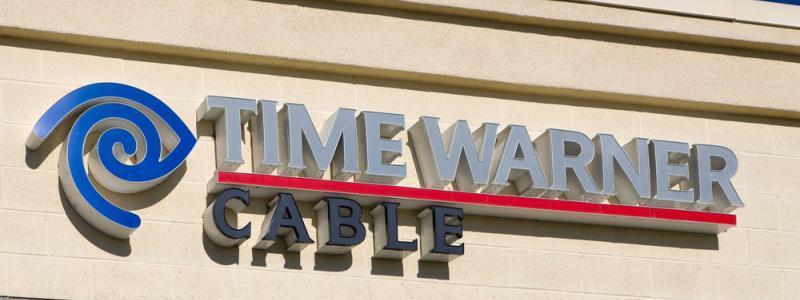Charter Buys Time Warner Cable and Bright House

Cable company Charter Communications announced on Tuesday that it plans to buy Time-Warner Cable along with Bright House Networks in a deal valued at $55 billion. If approved, the move would make Charter a larger and more competitive media company in America, bringing television, Internet, and phone service to one in six homes.
Time-Warner stock rose four percent after the announcement, meaning Charter will pay around $196 per share. This pushes Time-Warner's value to $79 billion, underscoring CEO Rob Marcus's commitment to increasing value for shareholders. Charter CEO Tom Rutledge gains a five-year extension on his contract and oversight of both companies.
The deal marks an historic moment for Charter, which has always been a small player in the cable market. Its service areas extend to several states, but its total subscriber base numbers under 10 million. After the deal is completed, the company will expand its numbers to 19 million on the broadband side and 17 million on the TV side.
While all three companies have not rated well with consumers, they agree that joining forces will bring improved service and offer more control over future television interests.
The New Charter
Calling itself the "New Charter," the company promised a better television service and faster broadband for customers along with more public WiFi availability. Rutledge stated that the combination of talent and resources would result in a more powerful network.
Time-Warner represents more than 11 million customers and allows Charter to gain a foothold in large markets like Los Angeles and New York City. The Time-Warner name will be going away in favor of Spectrum, which is the name that Charter currently uses to market its services.
After the merger is complete, Charter plans to sell cable television bundles via the Internet and expand its wireless footprint for the addition of a wireless phone service at some point in the future.
Will the Deal Go Through?
Charter is confident it will get the government approval it requires to complete the deal, even though Comcast failed at the very same thing only a few weeks ago. The difference between the two companies is vast. Comcast is already the top provider in the nation and owns a number of cable channels along with the NBC network. Even after the merger, Charter will still be smaller than Comcast and most telecoms, dispelling fears of a monopoly.
Rutledge stated that he hoped the deal would get government approval by the end of 2015. Craig Moffet, a cable industry analyst, expressed caution about the proposed merger, saying that Charter has to remain realistic that the deal might not be allowed.
Free Press, a public interest group that acted in opposition to Comcast, stated that the power of the cable industry to manipulate competition in online video is just as much a part of the current deal as it was the rejected one. The video issue was a major concern that aided in the failure of Comcast's acquisition.
Rob Marcus sent an email to current employees of Time Warner, acknowledging that the pending deal brings uncertainty. He said there is no way to know how long regulatory approval could take, but he was confident that the Department of Justice and Federal Communications Commission would start the review process soon.
In early May, Tom Wheeler, the current FCC chairman, told both Rutledge and Marcus that even though the Comcast deal did not go through, neither should assume the FCC is against the idea of other cable company mergers. Wheeler emphasized that every proposed merger is carefully reviewed to determine whether it is in the public interest. The process involves not only determining a lack of harm but also a clear demonstration of benefit to consumers.
Brian Roberts, the CEO of Comcast, said on Tuesday that the proposed deal makes sense, and he wishes both companies success in making it happen.
Related Blog Articles
- Apple Recaptures Title Of Most Valuable Brand In The World
- Introducing Smart Lock For Passwords: Google’s New Password Manager For Android Apps
- Will Foreign Companies Shake Up The American Cable Market?
- The Android One Initiative: Pushing For More Affordable Handsets In Emerging Mobile Markets
- Apple’s New Music Streaming Service To Debut Next Week At $10 A Month
- Customer Satisfaction Level With Wireless, Web, TV Services Lowest In 7 Years, Per Survey
- Huawei Introduces Its P8 Lite Smartphone To US Consumers
- Your Guide To Understanding AT&T Next Early Upgrade Plans
- iHeartRadio Now Has 70 Million Registered Users
- Mobile Users Watch Longer Videos On Their Smartphones, Per IAB Survey


 Menu
Menu